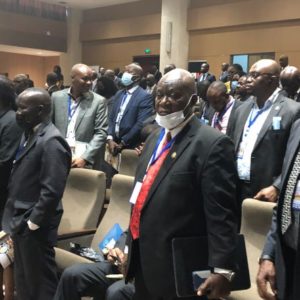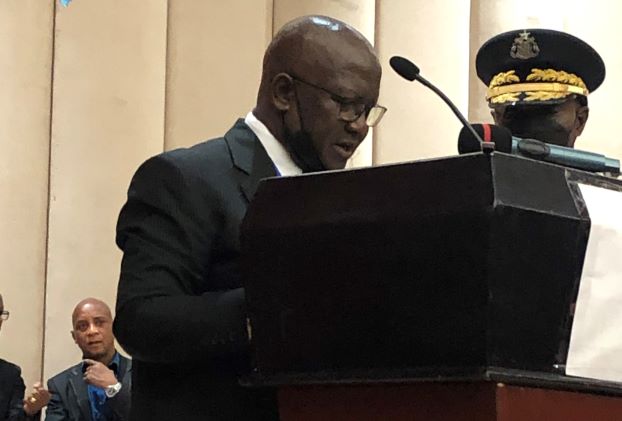PHOTO: Chief Justice Francis Korkpor addressing the occasion
By Garmah Never Lomo, garmahlomo@gmail.com
Monrovia, Liberia- Serving as a keynote speaker at a two-day assembly of the Liberian National Bar Association 2022 assembly, Chief Justice Francis Korkpor has called on members of the Bar and Justice Minister to draft a legislation that will lead to a creation of Appellate courts across the country to address the nightmare of overcrowded docket at the Supreme Court.
The assembly was held at the weekend under the theme: The Role of the Liberian National Bar Association in Strengthening the Rule of Law in Liberia.
Speaking over the weekend, the Liberian Chief Justice, who reaches the retirement age by September this year, outlined a number of factors responsible for the overcrowded docket at the highest court in the land.
He told gathering that they continue to experience overcrowded docket at the Supreme Court because there are more counties today and that the Liberian population has increased.

When the composition of the Supreme Court was set at five justices, Chief Justice Korkpor said there were nine counties and the population of the country was about 2.5 million.
But today, Liberia has fifteen counties and the current population of Liberia estimated to be pushing towards five million.
The creation of more counties means the establishment of more courts from which more cases are forwarded to the Supreme Court on appeal and the constitution of Liberia (1986) requires that all cases appealed to the Supreme Court be heard and decided, the outgoing Chief Justice said.
Another reason he gave for the need to create appellate courts is that ‘the horizon of Liberians has changed, meaning, more and more Liberians are today conscious of their legal rights and are resorting to court actions.’
The head of the Judiciary also noted that the practice in other countries including many countries in West Africa region, is to increase the number of justices on the Supreme Court Bench or to establish appellate courts with authority of final appellate jurisdiction in certain category of cases, so as to reduce the burden of overcrowded docket of the Supreme Court.
“From the many judicial conferences, workshops and seminars we conducted in the past, the overwhelming position adopted by lawyers, judges and other stakeholders to address this critical situation confronting the nation’s highest court in the creation of appellate courts.
Since the judiciary cannot make law and cannot therefore be involved in the process of making, the Ministry of Justice and the National Bar were given the responsibility to draft the appropriate legislation and place it before the legislature for passage into law.
My understanding is that some work has been done in this respect but it is taking too long to get the desired results. I therefore urge the National Bar to take leadership in this direction. This is an initiative that will strengthen the application of the rule of law. As long as the situation continues without solution, the docket of the Supreme Court will continue to be overcrowded, no matter whose Bench in charge,” Chief Justice Korkpor explained at the Bar assembly.
At the same time, the Liberian Chief Justice Korkpor says Rule of Law is a fundamental to national and international peace, security, economic and social progress and development and the protection of people’s rights and fundamental freedom, adding that the rule of is the best security a nation can have.
According to him, the rule of law embraces the philosophy that everyone is equal before and accountable to the law.
He further said, the rule of law has its origin in the Magna Carta, the first document published during the regime of King John of England in 1215 that stated in writing the principle that the king and his government were not above the law and it is the proclamation made in the Magna Carta that laid the foundation for modern day principles on equal right, justice and fair treatment under the law.
“The rule of law has been defined by the United Nations as: the principle of governance in which all persons, institutions and entities public and private including the state itself are accountable to laws that are publicly promulgated, equally enforced and independently adjudicated and which are consistent with international human rights norms and standards.
It requires measures to ensure adherence to the principles of supremacy of the law, equality before the law, accountable to the law, fairness in the application of the law, separation of powers, participation in decision making, legal certainty, avoidance of arbitrariness and procedural and legal transparency.”
The Chief Justice then cknowledged that the Bar does take on many important advocacy roles in the country, but he pointed out that the Bar needs to be more forthcoming in collaboration with the Supermen Court Bench, more robust and more proactive.
He stressed the need for Bar and the Bench to work together so that what one cannot do, the other will do and with cooperation, the Bar and Bench would move a mountain in strengthening the rule of law in our country.
Chief Justice Korkpor revealed that there are some key areas in the Judiciary where in his view the Bar can play critical advocacy role geared towards strengthening the rule of law.
He observed that the Judiciary faces a perennial problem of low budgetary support adding that the budget of the judiciary is not only lowest amongst the other branches of the government, but it is far lower than the budget of some Ministries and agencies in the Executive Branch of government.
“The problem which we inherited on assuming leadership of the Judiciary has continued over the years and is hampering reform and projects as well as diminishing the income of judges and judicial workers,” Chief Justice Korkpor stated.
Bar Pres. Urges Lawyers to uphold the Justice system
For his part, the president of the Liberian National Bar Association Cllr. Sylvester Rennie, said their gathering was meant to mark the National Assembly of the Bar.
Cllr. Rennie disclosed that their assembly was geared toward discussing issues concerning the Bar and finding a way forward in the implementation of their agenda.
According to him, in previous years, the Bar assembled quarterly to Mark said occasionm but it was reduced to one sitting after a national convention resolution.
Bar Bar President urged his colleagues to deliberate issues in the interest of the Bar and the Justice system.
Also speaking, the president of the Association of Female Lawyers of Liberia (AFELL)), Philimena Williams added that her institution is determined in their advocacy to ensure access to justice and straight adherence to the rule of law.
Madam Williams said AFEEL will endeavor at all times that violators of the law will be held accountable for their actions against women and girls.
She said AFEEL is one of the strong arm of the LNBA and will ensure to strengthen the rule of law but called on President Weah to nominate a female Chief Justice because women always change the narrative wherever they found themselves.
The just-ended Bar assembly was well-attended by not only lawyers across Liberia but also by representatives from the US embassy, United Nations High Commission on Human Rights, Liberian Vice President Jewel Howard-Taylor, and Justice Ministry officials.


Veteran Lawyer Cllr. Pearl Brown Bull (Middle) one of those leading the parade
The two-day also featured a parade from the SOS Clinic on the Tubman Boulevard and ended to the Ministerial Complex in Congo Town and working sessions, with various presenters.
At the end, several counts were suggested to form the resolution drafted.

